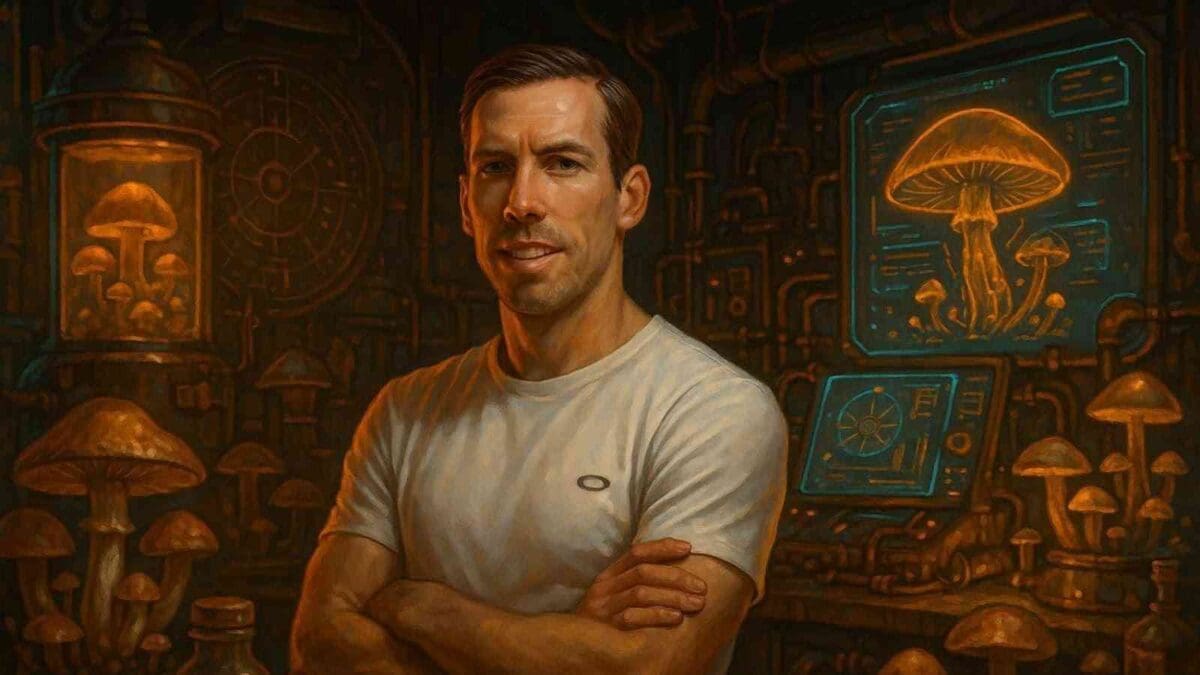In the pristine forests of Estonia, where Viking warriors once roamed, a quiet revolution is taking place. The country’s ancient relationship with functional mushrooms, particularly the powerful chaga that grows on birch trees, is being transformed into a modern wellness movement with global implications.
Silver Laus, partner and CEO of mycotechnology company Shroomwell, is at the forefront of this revolution, combining Estonia’s historical resilience with cutting-edge extraction technology to produce some of the world’s most powerful mushroom supplements.
“Shrooms make you well; it’s just a fact,” Laus explains. “Quality is crucial. It is essential to know where your mushrooms come from and choose products that actually work.”
A nation forged in resilience
Estonia’s unique position at the crossroads of northern Europe shaped its character through centuries of struggle. According to Laus, this small Baltic nation’s history is deeply intertwined with Viking culture, which is an aspect that many outsiders overlook.
“Estonia defended itself longer than any other nation in Europe during Viking times and kept its resilience and heritage alive through centuries of conquest,” explains Laus, highlighting how archaeological evidence shows that Estonia was the beginning of the Viking Age and the place where it ultimately ended.
“Our connection to nature isn’t just cultural: it’s survival,“ explains Laus. “Vikings may have left, but their ethos of adapting to harsh environments lives on in how we cultivate mushrooms.“
This resilience is reflected in the nation’s relationship with nature. While Christianity spread across Europe, condemning practices like sauna use, Estonians maintained their traditional knowledge and connection to the forest. Even today, the country operates under “every man’s right – a law allowing anyone to forage mushrooms and berries from any forest, whether publicly or privately owned.
The king of mushrooms
At the heart of Estonia’s mycological heritage is chaga, often known as „the king of mushrooms“ for its remarkable properties.
“Chaga is called the king of mushrooms for a reason: it has the highest antioxidant content of any substance known, supporting immune function and increasing stamina,” notes Laus.
Estonia’s approach to Chaga respects the mushroom’s natural development cycle, unlike many commercial products that rely on rapid indoor growth or mycelium cultivated on grain. Wild chaga requires 10-15 years to reach maturity on birch trees, developing its potent bioactive compounds in response to harsh environmental conditions.
“Mushrooms need stress to produce their powerful bioactive compounds; wild-grown chaga takes 15 years to develop its potency by enduring nature’s harsh conditions,” explains Laus.
Sustainable innovation in mushroom cultivation
Shroomwell’s approach to mushroom cultivation blends ancient wisdom with cutting-edge techniques. Rather than harvesting exclusively from wild sources, the company has developed sustainable farming methods that mimic natural stressors while increasing yield.
One innovative approach involves inoculating tree stumps left after forestry operations – a practice that not only produces mushrooms but also accelerates decomposition, enriching the soil and supporting local ecosystems.
The company has observed that forests with abundant chaga typically display greater biodiversity, suggesting these mushrooms play an important role in ecosystem health. This observation has helped build bridges with the forestry industry, turning potential adversaries into allies.
Shroomwell’s advanced extraction methods amplify several benefits. By using ultrasonic technology—high-frequency sound waves that rupture cell walls, they achieve 90–95% bioavailability of nutrients. It is significantly more than traditional hot-water extracts, which may capture only 60%. “Most companies settle for 60% efficiency,“ says Laus. “We refuse to cut corners when it comes to potency.“
The intelligence of fungi
The most fascinating thing about this topic is mushroom intelligence and communication. At Shroomwell’s production facility, researchers discovered that when lion’s mane mushrooms are harvested, they release chemical distress signals that cause nearby specimens to deteriorate.
“Mushrooms are intelligent and communicate distress signals, understanding their natural behaviour, which helps optimise sustainable and high-quality cultivation methods,” explains Laus.
This discovery led to practical changes in harvesting techniques, including isolating air supplies during harvest to prevent signals from spreading. It’s a reminder that fungi, despite being neither plant nor animal, possess sophisticated mechanisms for responding to their environment.
From tinctures to soft drinks
To increase accessibility, Shroomwell has developed various delivery methods beyond traditional capsules and powders, including tinctures, soft drinks and sprays. This diversification acknowledges different consumer preferences and lifestyle needs while maximizing bioavailability.
The company uses ultrasonic extraction technology that achieves 90-95% bioavailability of compounds, substantially higher than traditional methods that might capture only 60% or less of the mushrooms’ active constituents.
These innovations come at a pivotal moment when consumer preferences are shifting from energy drinks and alcohol toward functional beverages that support health and performance- a trend especially evident among younger consumers.
Navigating regulatory challenges
Despite growing scientific evidence supporting functional mushrooms’ benefits, European regulations remain restrictive for certain species. For example, Turkey tail mushrooms are forbidden in most European countries despite growing naturally throughout the continent.
Shroomwell navigates these challenges by producing Turkey tail products for export to markets where they’re permitted, while working with regulators to expand acceptance based on scientific research and traditional use.
The future of functional fungi
As interest in natural health solutions continues to grow, Estonia’s unique approach to mushroom cultivation positions it as a leader in the functional fungi space. The country’s combination of pristine growing environments, traditional knowledge and technological innovation creates products that stand apart in a market often plagued by quality concerns.
For Laus and Shroomwell, this work represents more than business opportunity: it’s about honouring Estonia’s resilient heritage while creating sustainable wellness solutions for modern life.
“Every mushroom is functional. Every mushroom has a purpose,” reflects Laus, noting that humans share approximately 60% of their DNA with fungi. This genetic connection may explain why we respond so positively to their nutrients and bioactive compounds.
In a world increasingly disconnected from natural systems, Estonia’s approach to functional mushrooms offers a compelling model of how traditional wisdom and modern science can come together to enhance human and ecological health.
References
- Were There Vikings In Estonia? – Viking Style
- Archeologists Unearth Human Bones and Viking-Era Settlement in Viru-Nigula, Estonia
- How Do People Use the Natural Environment in Estonia?
- Research-Backed Health Benefits of Chaga Mushroom
- Why Extraction Techniques Matter for Mushroom Tinctures
- Viking History in Estonia – Visit Europe
- Grow Chaga on Live Birch Trees
- The Language of Mushrooms – Can They Really Talk?
- Shroomwell Factory Tour – Visit Estonia
- Turkey Tail Mushroom EU Petition


Leave a Reply